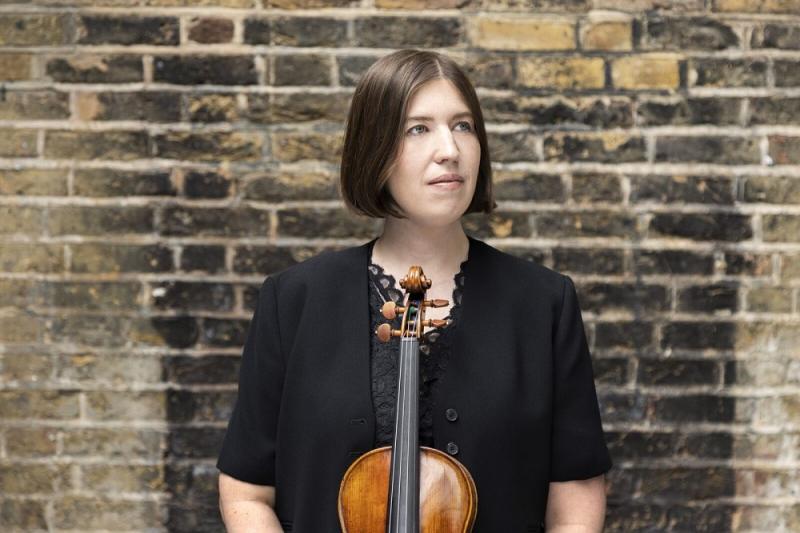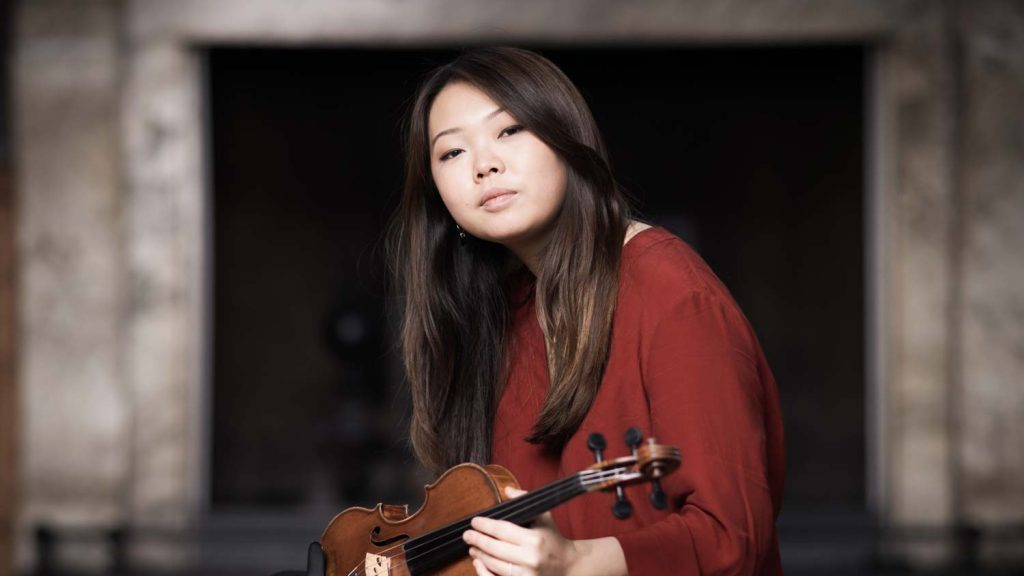Castalian Quartet, Edinburgh International Festival 2023 review - nothing taken for granted | reviews, news & interviews
Castalian Quartet, Edinburgh International Festival 2023 review - nothing taken for granted
Castalian Quartet, Edinburgh International Festival 2023 review - nothing taken for granted
A tightly constructed programme, including a surprising Turnage premiere

This concert, the Edinburgh International Festival debut of the Castalian Quartet, almost didn’t happen due to the illness of their second violin, Daniel Roberts. Then, a couple of days ago, in stepped Yume Fujise, leader of the Kleio Quartet, to save the day, which is no mean feat considering that this programme featured both a world premiere and the knottiest of Beethoven’s late quartets.
She did a terrific job, though (Fujise pictured below), as did the other three. In fact, they built the programme around that premiere, Mark-Anthony Turnage’s Awake. Turnage’s inspiration came from Beethoven and his relationship with violinist George Bridgetower, which helps to explain the choice of both Janáček’s Kreutzer Sonata Quartet and Beethoven’s Opus 130 Quartet, complete with its Grosse Fuge finale.
Quite a programme, then. Astonishingly, however, Turnage’s new piece was perhaps the warmest, most welcoming thing in it. Anyone expecting dissonant roaring from this (former?) enfant terrible would have gone away disappointed, because this two-movement string quartet had a gorgeously soft texture that was full of beautiful melodies. Yes, from Turnage! It began with a wistful violin solo against pizzicato cello, which was soaringly beautiful in itself and carried hints of Webern in the warmth of its scoring. That carried on into the second movement where even the energetic passages were carefully balanced and gentle, and all the musical interruptions seemed quiet and interrogative rather than explosive or disruptive. The ending of his quartet carried strains of the same duskiness that we would hear in the Janáček, and it ended on a beautifully inconclusive question mark. Is this a new Turnage we’re encountering? If so, I’d like to hear more of him.  The Castalians played it with sensitivity and gentility, allowing its surprising warmth and gentleness to breathe on its own terms. If anything, it was their playing of Janáček’s Kreutzer Sonata Quartet that carried more urgency and drama, particularly those agitated interruptions that the composer repeatedly uses to inject urgency and drama. Under the Castalians’ bows they became more pressing and more terrifying as the quartet developed, standing in marked contrast to the muted opening, dusky yet vibrant, as well as the unconvincing resting point of its ending.
The Castalians played it with sensitivity and gentility, allowing its surprising warmth and gentleness to breathe on its own terms. If anything, it was their playing of Janáček’s Kreutzer Sonata Quartet that carried more urgency and drama, particularly those agitated interruptions that the composer repeatedly uses to inject urgency and drama. Under the Castalians’ bows they became more pressing and more terrifying as the quartet developed, standing in marked contrast to the muted opening, dusky yet vibrant, as well as the unconvincing resting point of its ending.
And Beethoven’s B flat Quartet veritably sang with the warmth of tone they gave to it. Not consistently, however. In the first movement they lavished vibrato on it, giving space for the music to ebb and flow, but then vibrato was in short supply during the Grosse Fuge, giving it an edgy, emaciated quality that made each line sound even more craggy and eternally strange than it always does. The Presto flickered and the German Dance bounced, but the emotional focal point came in a gorgeously played Cavatina, full of grace, elegance an inward beauty.
This concert contained music from the 1820s, 1920s and 2020s, and each piece had its own carefully constructed, bespoke sound world. Nothing was taken for granted here, and there were no short cuts. That’s what made it so powerful.
rating
Share this article
The future of Arts Journalism
You can stop theartsdesk.com closing!
We urgently need financing to survive. Our fundraising drive has thus far raised £49,000 but we need to reach £100,000 or we will be forced to close. Please contribute here: https://gofund.me/c3f6033d
And if you can forward this information to anyone who might assist, we’d be grateful.

Subscribe to theartsdesk.com
Thank you for continuing to read our work on theartsdesk.com. For unlimited access to every article in its entirety, including our archive of more than 15,000 pieces, we're asking for £5 per month or £40 per year. We feel it's a very good deal, and hope you do too.
To take a subscription now simply click here.
And if you're looking for that extra gift for a friend or family member, why not treat them to a theartsdesk.com gift subscription?
more Classical music
 Hallé John Adams festival, Bridgewater Hall / RNCM, Manchester review - standing ovations for today's music
From 1980 to 2025 with the West Coast’s pied piper and his eager following
Hallé John Adams festival, Bridgewater Hall / RNCM, Manchester review - standing ovations for today's music
From 1980 to 2025 with the West Coast’s pied piper and his eager following
 Kaploukhii, Greenwich Chamber Orchestra, Cutts, St James's Piccadilly review - promising young pianist
A robust and assertive Beethoven concerto suggests a player to follow
Kaploukhii, Greenwich Chamber Orchestra, Cutts, St James's Piccadilly review - promising young pianist
A robust and assertive Beethoven concerto suggests a player to follow
 Robin Holloway: Music's Odyssey review - lessons in composition
Broad and idiosyncratic survey of classical music is insightful but slightly indigestible
Robin Holloway: Music's Odyssey review - lessons in composition
Broad and idiosyncratic survey of classical music is insightful but slightly indigestible
 Classical CDs: Wolf-pelts, clowns and social realism
British ballet scores, 19th century cello works and contemporary piano etudes
Classical CDs: Wolf-pelts, clowns and social realism
British ballet scores, 19th century cello works and contemporary piano etudes
 Bizet in 150th anniversary year: rich and rare French offerings from Palazzetto Bru Zane
Specialists in French romantic music unveil a treasure trove both live and on disc
Bizet in 150th anniversary year: rich and rare French offerings from Palazzetto Bru Zane
Specialists in French romantic music unveil a treasure trove both live and on disc
 Scottish Chamber Orchestra, Ibragimova, Queen’s Hall, Edinburgh review - rarities, novelties and drumrolls
A pity the SCO didn't pick a better showcase for a shining guest artist
Scottish Chamber Orchestra, Ibragimova, Queen’s Hall, Edinburgh review - rarities, novelties and drumrolls
A pity the SCO didn't pick a better showcase for a shining guest artist
 Kilsby, Parkes, Sinfonia of London, Wilson, Barbican review - string things zing and sing in expert hands
British masterpieces for strings plus other-worldly tenor and horn - and a muscular rarity
Kilsby, Parkes, Sinfonia of London, Wilson, Barbican review - string things zing and sing in expert hands
British masterpieces for strings plus other-worldly tenor and horn - and a muscular rarity
 From Historical to Hip-Hop, Classically Black Music Festival, Kings Place review - a cluster of impressive stars for the future
From quasi-Mozartian elegance to the gritty humour of a kitchen inspection
From Historical to Hip-Hop, Classically Black Music Festival, Kings Place review - a cluster of impressive stars for the future
From quasi-Mozartian elegance to the gritty humour of a kitchen inspection
 Shibe, LSO, Adès, Barbican review - gaudy and glorious new music alongside serene Sibelius
Adès’s passion makes persuasive case for the music he loves, both new and old
Shibe, LSO, Adès, Barbican review - gaudy and glorious new music alongside serene Sibelius
Adès’s passion makes persuasive case for the music he loves, both new and old
 Anja Mittermüller, Richard Fu, Wigmore Hall review - a glorious hall debut
The Austrian mezzo shines - at the age of 22
Anja Mittermüller, Richard Fu, Wigmore Hall review - a glorious hall debut
The Austrian mezzo shines - at the age of 22
 First Person: clarinettist Oliver Pashley on the new horizons of The Hermes Experiment's latest album
Compositions by members of this unusual quartet feature for the first time
First Person: clarinettist Oliver Pashley on the new horizons of The Hermes Experiment's latest album
Compositions by members of this unusual quartet feature for the first time

Add comment